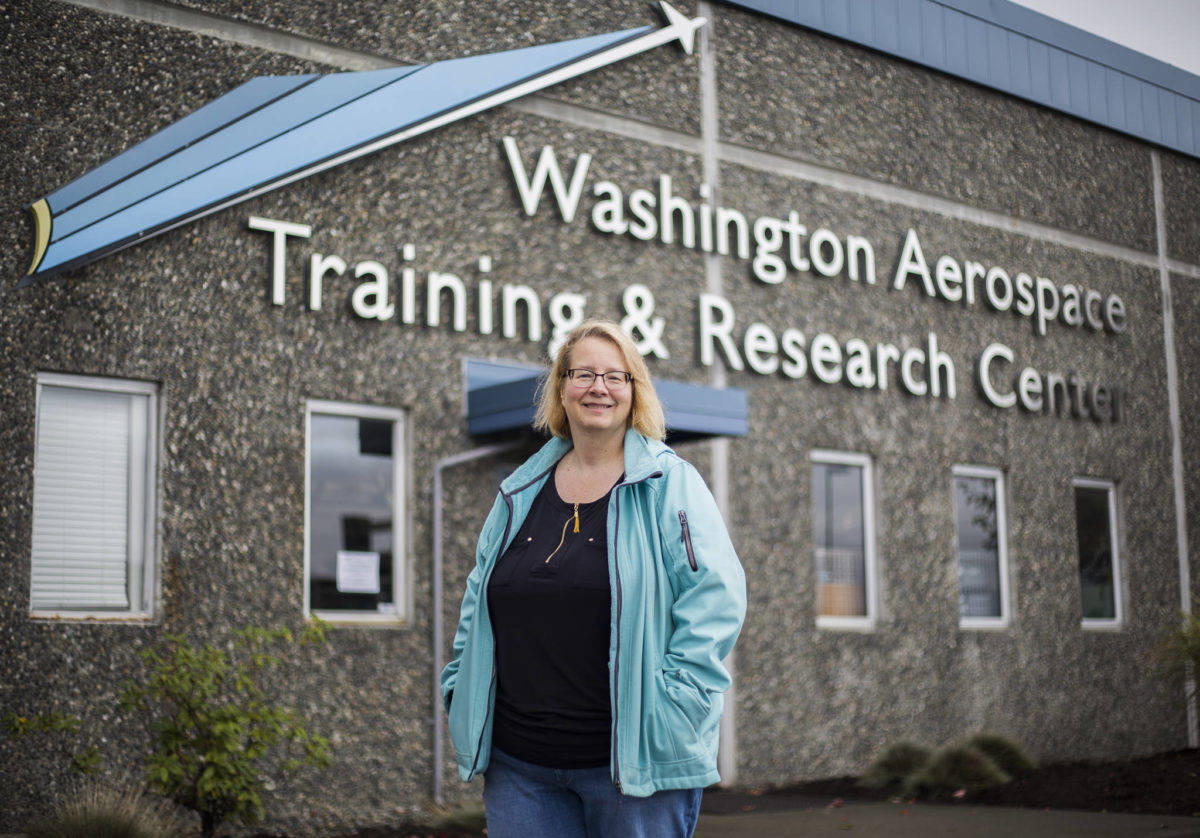After years away from the aviation industry, Melanie Evans, 50, was interested in returning to the field where she felt happiest.
In the early 2000s, Evans, a South Whidbey resident, worked on the Boeing 747 for about eight years. After layoffs forced her out of the industry, she worked as a massage therapist and in retail, but it was no longer where she wanted to be.
“I just really had my heart back on aviation; I really felt like that is where I truly belonged,” Evans said.
At the end of 2019, she enrolled in the quality assurance retraining course at the Washington Aviation Training and Resource (WATR) Center. Managed through Edmonds College, the 12-week program ends in a certification that qualifies students for opportunities in the aerospace and manufacturing fields.
Evans anticipated a quick path to certification that would get her back working as soon as possible. Then the pandemic hit, the school closed and her expected March completion was postponed until September.
These days, between the COVID-19 pandemic and the worldwide grounding of the Boeing 737 Max after 346 people died in two crashes, the future is uncertain. The reality is the industry is shedding workers at a time Evans wants back in.
Since the onset of the global health crisis, Boeing Co. has eliminated nearly 13,000 jobs in Washington through voluntary departures and involuntary layoffs, in addition to announcing the move of all 787 production to South Carolina, which could cost more jobs.
According to data from the state Employment Security Department, around 15,000 jobs have been lost across aerospace manufacturing in the state.
Gina Certain is the director of worker retraining at Edmonds College. She said the program has been in heavy demand since March. Laid-off workers want to learn new skills and get back to work.
It is a sad but familiar story. Certain said she’s heard from more than 100 Boeing employees affected by summer dismissals.
“Every week we are seeing these workers as their layoff notices come, wanting to know about retraining opportunities,” Certain said last month. In a time of uncertainty, she said, education provides a path to stability.
Staff help evaluate a worker’s current skills, abilities and interests to decide what program fits best. Certain said a lot of workers are looking at new career opportunities with their training. Top choices have included business management, engineering technology and computer information systems.
After 30 years at Edmonds College, Certain is well practiced in assisting workers through industry layoffs. She said the school is ready and geared up to meet the needs of local workers.
“That’s what we do at the college, figure out what the next step is and help them look at new options for training and what that might look like for them to help them get started,” Certain said.
Everett Community College faced a similar uptick this year. Jessica Manfredi is a worker retraining program specialist. She said the school was swamped in the late summer months as laid-off employees searched for opportunities to expand their skills.
With more than 30 retraining opportunities, the school looks to supplement expertise workers already have.
Enrollment this quarter is up by more than 100 students, Manfredi said. She estimated that more than half the new trainees were employees who lost jobs in the aviation industry.
Evans remembers the anxiety of Boeing layoffs well.
“When you’re still employed with the company, it’s hard because you watched a lot of your friends that you bond with leave out of the company and you’re still stuck there to try to keep up with the load,” she said.
Evans lost her job in 2003. She recalled high anxiety, stress and feeling like her life was put on hold as she figured out what to do next.
With financial assistance from Boeing, Evans retrained as a massage therapist, a career she pursued for 14 years before trying to come back to aviation manufacturing.
Structural mechanic Rhea Dondriano, 33, trained in the same quality assurance program as Evans. The group learned to evaluate aspects of airplane construction to ensure everything is up to standard.
At night, Dondriano, of Arlington, worked on the Boeing 767 line in Everett, then she’d attend class at the WATR Center, paid for by Boeing.
She saw retraining as an opportunity to move up from the physically strenuous job that leaves her with back pain and aching hands. She said Boeing offers internal training opportunities, but they don’t transfer to other companies.
WATR Center instructor Netti Collins taught the quality assurance program. She tells her students the more they know, the more attractive they are to potential employers.
Training to keep skills current or learn new ones opens opportunities beyond just aerospace, she said.
“What we are teaching here are not skills necessarily just for aerospace or just for Boeing, we are teaching skills people can use in other areas,” Collins said.
For now, Evans is working with a staffing agency while she looks for a job. She’s open to work anywhere, even if that means returning to the company that laid her off.
“It does make me nervous, but if you think about it, what truly do you have as far as a certainty with any type of job?” she said.
“We are in a pandemic. It’s not just Boeing, it’s everywhere.”



